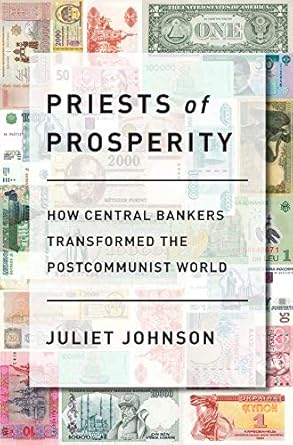If you’re curious about the transformative journey of postcommunist central banks and their shift from command economies to modern monetary guardians, “Priests of Prosperity: How Central Bankers Transformed the Postcommunist World” is a must-read. Juliet Johnson’s compelling narrative, enriched by over 160 interviews across 17 countries, delves into the intricate web of influences that shaped these institutions during a pivotal era in global finance. This insightful book reveals how a powerful transnational community of central bankers from Western Europe and North America played a crucial role in redefining the central banking landscape in countries like Hungary, Russia, and Kyrgyzstan.
With a focus on the evolution of policies and practices, Johnson’s detailed comparative studies not only highlight the successes but also the ongoing challenges faced by today’s central bankers. Whether you’re a scholar, policymaker, or simply someone interested in the dynamics of international finance, “Priests of Prosperity” offers invaluable insights into the complexities of global governance and economic development.
Priests of Prosperity: How Central Bankers Transformed the Postcommunist World (Cornell Studies in Money) Reprint Edition,
Why This Book Stands Out?
- In-Depth Research: Juliet Johnson conducted over 160 interviews across 17 countries, providing unparalleled insights into the transformation of central banks in the postcommunist world.
- Comparative Analysis: The book features detailed case studies from Hungary, the Czech Republic, Slovakia, Russia, and Kyrgyzstan, offering a nuanced understanding of each country’s unique challenges and triumphs.
- Transnational Perspective: Johnson highlights the powerful network of Western central bankers that influenced and shaped the ideologies of their postcommunist counterparts, revealing the interconnectedness of global finance.
- Historical Context: The narrative spans from the late 1980s to the aftermath of the global financial crisis, situating current central banking dilemmas within a rich historical framework.
- Broad Appeal: This book is not just for economists; it captivates scholars and practitioners from political science, geography, and sociology, making it a valuable resource for anyone interested in the evolution of global governance.
- Timely Relevance: As today’s central bankers navigate complex national and international landscapes, Johnson’s insights are crucial for understanding the future of economic development and international finance.
Personal Experience
Reading Priests of Prosperity was a journey that resonated deeply with me, not just as a reader but as someone curious about the intricate workings of our global economy. Juliet Johnson’s exploration of the transformation of postcommunist central banks feels not only like an academic study but also a personal narrative of struggle, resilience, and adaptation. It’s a reminder of how interconnected our world is, and how the decisions made in one part of the globe can ripple through to affect us all.
As I delved into the pages, I couldn’t help but reflect on my own experiences with change and the often tumultuous path it follows. The stories of central bankers navigating their new roles reminded me of moments in my life when I faced uncertainty and had to adapt to new realities. I found myself relating to their challenges of balancing external expectations with internal convictions—a conflict I believe many of us encounter in our professional lives.
- The Power of Transformation: This book highlights how change is not just about policies but also about the people behind them. It made me think about the transformative moments in my own life and career, where I had to redefine my role in response to shifting circumstances.
- Understanding Complexity: Johnson’s insights into the complexities faced by central bankers resonated with my experiences in navigating complicated decisions. It reminded me that growth often comes from grappling with difficult choices and finding clarity amidst chaos.
- Global Connections: The transnational central banking community illustrated in the book reflects our interconnected lives today. It sparked memories of my travels and interactions with people from diverse backgrounds, each sharing unique perspectives that shaped my understanding of the world.
- Lessons in Resilience: The resilience demonstrated by the central bankers in adapting to new systems served as a powerful reminder that we all have the capacity to evolve and grow, even in the face of adversity.
In essence, Priests of Prosperity is more than just a scholarly work; it’s a mirror reflecting the complexities of human experience and the shared journey of transformation. As I turned the last page, I felt a sense of connection to the challenges faced by these central bankers, and I was left with a renewed appreciation for the intricate dance of economic policy and personal resilience.
Who Should Read This Book?
If you’re curious about the intricate world of central banking and its impact on global finance, Priests of Prosperity is a must-read for you. This book is not just for economists or finance professionals; it has a wide appeal and offers valuable insights for various audiences. Here’s why this book is perfect for you:
- Students and Scholars: If you’re studying political science, economics, or sociology, this book provides a deep dive into the evolution of central banking in postcommunist countries. Juliet Johnson’s extensive research and interviews will enrich your understanding of the subject.
- Policymakers: For those working in government or international organizations, the insights on how central banks have transformed can guide future economic strategies and policies in emerging markets.
- Finance Professionals: If you’re in the private sector, understanding the challenges and developments in central banking can give you a competitive edge in financial markets and investment decisions.
- General Readers with Interest in Global Affairs: Even if you’re not a finance expert, if you’re passionate about how economic systems operate and influence everyday life, this book will provide you with engaging narratives and case studies that illuminate complex concepts.
What makes Priests of Prosperity unique is its combination of rigorous research and accessible storytelling. Juliet Johnson captures the voices of central bankers and policymakers, offering a rare glimpse into their world. You’ll walk away not only with knowledge but also with a greater appreciation for the challenges they face in balancing international norms and local politics.
Priests of Prosperity: How Central Bankers Transformed the Postcommunist World (Cornell Studies in Money) Reprint Edition,
Key Takeaways
“Priests of Prosperity” offers a deep dive into the transformation of postcommunist central banks, providing valuable insights into the interplay between global finance and local governance. Here are the key points that make this book a compelling read:
- Transformative Campaign: Explores the revolutionary efforts to redefine central banks from command-economy entities to modern monetary institutions.
- Extensive Research: Based on over 160 interviews conducted across 17 countries, offering a rich tapestry of perspectives from central bankers, policymakers, and finance professionals.
- Transnational Networks: Highlights the role of a powerful transnational community that influenced postcommunist central bankers, shaping their understanding of central banking principles.
- Comparative Analysis: Provides detailed case studies of central bank evolution in key countries like Hungary, the Czech Republic, and Russia, illuminating varied challenges and successes.
- Modern Monetary Tools: Discusses the development of contemporary central banking tools and strategies that emerged from this transformation.
- Post-Financial Crisis Context: Examines the ongoing challenges faced by central bankers in a post-global financial crisis world, including balancing international principles with national interests.
- Interdisciplinary Appeal: Suitable for readers from diverse fields such as political science, economics, and sociology, making it a valuable resource for scholars and practitioners alike.
Final Thoughts
“Priests of Prosperity” is an essential exploration into the transformative journey of central banks in the postcommunist world. Author Juliet Johnson meticulously weaves together narratives from over 160 interviews conducted across seventeen countries, providing unique insights into how central bankers have evolved from relics of command economies to vital players in the global financial arena. This book not only highlights the challenges faced by these institutions but also the profound impact of a transnational central banking community.
- In-depth analysis of central bank development in Hungary, the Czech Republic, Slovakia, Russia, and Kyrgyzstan.
- Explores the integration of postcommunist bankers into Western monetary practices.
- Addresses the ongoing conflicts between national responsibilities and global standards.
- Engages a broad audience across various fields including political science, economics, and sociology.
Whether you are a scholar, a central banker, or simply someone interested in the dynamics of international finance and economic development, this book is a remarkable addition to your collection. It offers a compelling narrative that not only informs but also prompts critical thinking about the future of central banking in an increasingly complex world.
Don’t miss the opportunity to dive into this enlightening read. Grab your copy of Priests of Prosperity today and discover the intricate world of central banking transformation!





